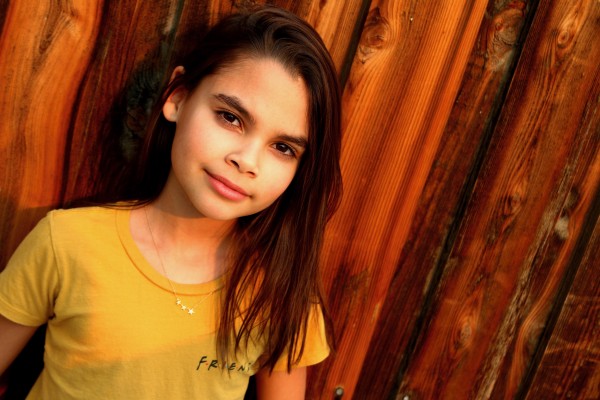The power of art lies in its ability to reflect the truth and envision something better. When art manages to strike that balance, it also tends to stick and ideally make an impact, be it inspiring people towards a movement or inspiring people to look and feel within themselves. For 20-year-old singer/songwriter Alma Grace, she says she intends to make music for a “more just world.”
Describing herself as an artist and an activist collectively, her devotion to both was born out of her observing her surroundings. “When I first started writing, I wrote a song every day. I religiously listened to the greats–Jeff Buckley for his lyricism, The Beatles for their melodies…I read biographies of Patti Smith and Dolly Parton and stole their artistic practices. I also tapped into different genres, from folk to R&B to Latin. I think it’s important for writers to be familiar with all walks of music,” Alma Grace says about coming into her own as a singer-songwriter.
 “I grew up in a family of Mexican immigrants–people who sacrificed a lot to come to this country, and who were discriminated against, cursed at, and underestimated,” she starts about what drove her to activism at a young age. Like many Black and Brown youth, seeing and experiencing the effects of racism and the xenophobia that is tied to how immigration is perceived led to her knowing that something had to change. “That upbringing forced me to be politically active and to care about issues pertaining to racism and immigration policy. I attended my first protest at 13 and ever since then, I’ve recognized the importance of action and advocacy–especially as someone who holds white-passing privilege.”
“I grew up in a family of Mexican immigrants–people who sacrificed a lot to come to this country, and who were discriminated against, cursed at, and underestimated,” she starts about what drove her to activism at a young age. Like many Black and Brown youth, seeing and experiencing the effects of racism and the xenophobia that is tied to how immigration is perceived led to her knowing that something had to change. “That upbringing forced me to be politically active and to care about issues pertaining to racism and immigration policy. I attended my first protest at 13 and ever since then, I’ve recognized the importance of action and advocacy–especially as someone who holds white-passing privilege.”
Along with protests, Alma Grace has volunteered at community-based organizations in Harlem and continued to work defending immigrants facing deportation. The dedication to advocacy has found itself seeping into her music as well. While she doesn’t necessarily make “protest songs,” she’s described the goal of her music to be, “art with a social conscience—writing songs powerful enough to right systemic wrongs.”
In “Girl Fight,” the first single off of her upcoming debut EP, FRIDA, she takes a personal experience of hers and redefines it into a triumphant bisexual anthem. “I wrote ‘Girl Fight’ during my freshman year of college after finding out that the guy who ghosted me had started seeing someone new. I met her by chance and she turned out to be a lot more attractive and cooler than he ever could be,” she says about the song’s backstory. It’s a fitting first song to introduce her Frida Kahlo-inspired EP considering Frida having a similar experience.
[‘Girl Fight’] comes from a place of honesty and experience–it’s tongue in cheek, but it’s also a story of finding something more open and caring.
“I had already started working on my EP and was watching a Frida documentary when I learned that Frida had an affair with the same woman Diego had cheated on her with. ‘Girl Fight’ is me imagining that I could be as much of a badass as Frida was,” Alma Grace shares. “The song also fights against the trope of women fighting over men…we’re better off with each other!”
The song was written in her college’s piano practice room, but that was just the beginning of the journey for the final product. With the help of her mentor Nisha Asnani, they made edits to the song and sent it off to producer Dave Berg for the demo. “I put it down for a year, I actually gained distance from the whole FRIDA project during that time and then recruited Vancouver producer David Ziehr to finish the track off. It’s been a labor of love,” Alma Grace exclaims.
 “The song comes from a place of honesty and experience–it’s tongue in cheek, but it’s also a story of finding something more open and caring,” she says when I ask her about how she figured out how she wanted the song to play out in terms of exploring bisexuality especially when bisexuality in girls can often be sexualized in music. “The second verse explores this theme in detail: ‘if you want to feel safe, understood, and left some room to breathe / if he can’t open up, can’t compete with my sincerity.'”
“The song comes from a place of honesty and experience–it’s tongue in cheek, but it’s also a story of finding something more open and caring,” she says when I ask her about how she figured out how she wanted the song to play out in terms of exploring bisexuality especially when bisexuality in girls can often be sexualized in music. “The second verse explores this theme in detail: ‘if you want to feel safe, understood, and left some room to breathe / if he can’t open up, can’t compete with my sincerity.'”
“I want nothing more than for my music to bring people together. As a female artist, I’m conscious of the kind of art I’m putting out there–especially for my younger listeners,” she says in response to the usual pop music trope of pitting girls against each other over a guy and the response to that trope which is making room for girls loving and giving love to other girls. “Most of my songs that are out right now have a social message attached to them.” She mentions her songs, “Fine Lines,” “Adios Maria,” and “You Are Here” which are about consent, immigrant mothers, and mental health/anxiety respectively. “I want my work to make a tangible impact on people’s lives,” she concludes.
I want my work to make a tangible impact on people’s lives.
Her next single for the EP, “Aventura” comes out this Friday, but until then, Alma Grace hopes that “Girl Fight” resonates with people as both a favorite story about Frida and also as something personal to her–just like the EP. “[‘Girl Fight’] also has a lot of personal significance to me, so I hope that my audience is able to gauge that intersection–yes, it is a project inspired by Frida Kahlo, but it’s also about me growing up and discovering my own artistic identity.”
Having a background in acting, Alma Grace says her time as a child actor at times impacted her self-esteem and confidence. “I was told that I wasn’t ‘white enough’ for most of the roles on Broadway in 2011 and that I should pluck and dye my bushy eyebrows,” she recalls. Searching for something/someone that she could look to for empowerment and self-love, and with the help of her grandmother, she found Frida Kahlo. “I identified with Frida at a young age because she didn’t follow any of the typical beauty standards that I was introduced to and yet, she was so iconic and revered. And she was an artist, which is all I’ve ever wanted to be. She’s inspired me to find the beauty in myself, to embrace my background, and own who I am,” Alma Grace declares.
That also serves as the basis of the EP, which is her first time creating a body of work of this caliber. “It’s been a little daunting, but I’m so excited that this is my artistic introduction to the world. Anyone who knows me knows my very extensive collection of Frida paraphernalia–from coasters and books to posters and matchboxes, Frida is omnipresent in my life. I started this body of work two years ago and I definitely needed distance from it to better define my sound,” Alma Grace looks back and admits. “I spent the past year focusing on other projects until this summer when I wrote and recorded the last two songs on the EP. Those last two songs have a mix of English and Spanish, which was important because I wanted to reflect on my second-generation identity.”
FRIDA is a four-track EP, but 10-12 were written for the project. Explaining why they all didn’t make it, Alma Grace shares that she felt herself growing musically from the start of the project to now. “I hope to one day give a sneak peek of those early songs because they were so integral to getting to the four that are on the EP,” she says.
She also found herself growing and understanding herself more as she created not only a tribute to Frida Kahlo but also an autobiographical look at herself. “Part of the reason that I took such a long break from the FRIDA project was because I needed to write for myself again. I got too consumed by her world and the songs that I was writing no longer felt honest and resonant to my life,” Alma Grace says. While the EP is inspired by Frida, it couldn’t be only about Frida, so she had to figure out what writing for herself felt like again. “Spending my songwriting time focusing on my own life helped me get out of this rut and allowed me to come back to the EP with fresh eyes,” she says.
I’ve done a lot of growing in that time and it’s really special to have a time capsule like this project to look back on.
 Focusing on herself also gave her the space for self-discovery and coming to terms with her own identities and outlook on life. “I was very uncomfortable and uncertain about my sexual identity starting this process–I didn’t know how much of that part of my life I wanted to include, because it’s not something I’m very open about. Writing through the lens of Frida allowed me to talk about topics that I otherwise wouldn’t address in my music, but ones that are still very salient to me.” In that way, Frida worked as a shame-free outlet for Alma Grace to channel her own life into. “Each song that I wrote helped me deal with my own challenges–from getting ghosted, to not feeling beautiful enough to be an actress, this EP catalogs my coming of age journey from ages 18-20. I’ve done a lot of growing in that time and it’s really special to have a time capsule like this project to look back on.”
Focusing on herself also gave her the space for self-discovery and coming to terms with her own identities and outlook on life. “I was very uncomfortable and uncertain about my sexual identity starting this process–I didn’t know how much of that part of my life I wanted to include, because it’s not something I’m very open about. Writing through the lens of Frida allowed me to talk about topics that I otherwise wouldn’t address in my music, but ones that are still very salient to me.” In that way, Frida worked as a shame-free outlet for Alma Grace to channel her own life into. “Each song that I wrote helped me deal with my own challenges–from getting ghosted, to not feeling beautiful enough to be an actress, this EP catalogs my coming of age journey from ages 18-20. I’ve done a lot of growing in that time and it’s really special to have a time capsule like this project to look back on.”
“The most fulfilling part was probably deciding to put it out,” she admits while also sharing an initial hesitancy to include her earlier songs even if they didn’t accurately reflect where she is now as a writer and artist. “But I couldn’t think of a better way to introduce myself to the world than this project–it’s become so special to me, and I’m very excited for you all to hear it,” she exclaims.
Along with the release of the EP, she’s also working on some music videos while she’s at school in New Haven at Yale. Along with her director Ryan Zhou, with a smile, Alma Grace says that the FRIDA music videos are going to draw on Frida’s vibrant life and color palette while exploring what it means to be a 20-something in 2021.
Outside of Frida Kahlo, Alma Grace also draws inspiration from artists like Selena, Shania Twain, and Lauryn Hill. She exclaims that Selena’s “I Could Fall in Love” is one of her favorite songs to sing while also uplifting Lauryn Hill’s “To Zion” (a Carlos Santana-accompanied lullaby dedicated to her son about her decision to continue her pregnancy and how motherhood fit into her life during a pivotal part of her career and life) as a masterpiece.
While Shania Twain taught her witty comebacks, she says that Selena taught her how to love and Lauryn Hill taught her how to turn pain into art. “Each of those artists were very lyrically focused and this EP is definitely all about narrative and story,” she says about how their influences on her can be reflected in FRIDA. “Especially with Selena, I always admired how her bilingual and bicultural identity came out in her music–the next three songs on the project are in both English and Spanish with more Latin sonic influences,” she closes out careful not to give too much away.
~~~
Alma Grace’s Mini Playlist for Readers:
~~~
You can stay up to date on all things Alma Grace by following her Twitter, Instagram, and Facebook accounts.
“Girl Fight” is available wherever you get music. Her next single “Aventura” releases March 26th. Alma Grace’s debut EP FRIDA drops May 5th.
(photo cred: Lara Callahan)




